WASHINGTON, D.C. -- More Americans are worried about not having enough money for retirement (66%) than are worried about seven other financial matters Gallup asked about. Majorities of Americans, however, are also very or moderately worried about not being able to pay medical costs for a serious illness or accident and about not being able to maintain their standard of living.
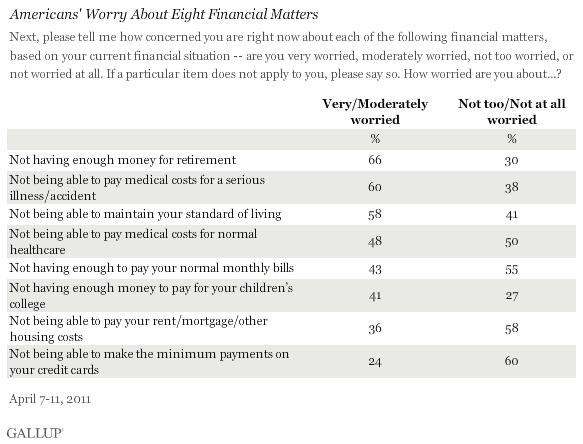
In the April 7-11, 2011, poll, Gallup's annual survey on the economy and personal finance, Americans were least likely to be worried about not making minimum credit card payments (24%) and not being able to pay for their housing costs (36%).
Gallup has tracked Americans' worries about these eight financial items annually since 2001, and has found that the top three concerns have consistently been retirement, medical costs related to a serious illness or accident, and maintaining their current standard of living.
While the order of Americans' worries has generally stayed the same over time, concern about each individual item increased at least somewhat during the recession, and all are up significantly from 2001.
Worry About Standard of Living at a New High
The 58% of Americans who are worried -- and the 27% who are "very worried" -- about not being able to maintain their current standard of living is the highest on record.
Americans' concerns about their standard of living initially spiked during the recession and have remained above pre-recession levels before reaching the new high this year.
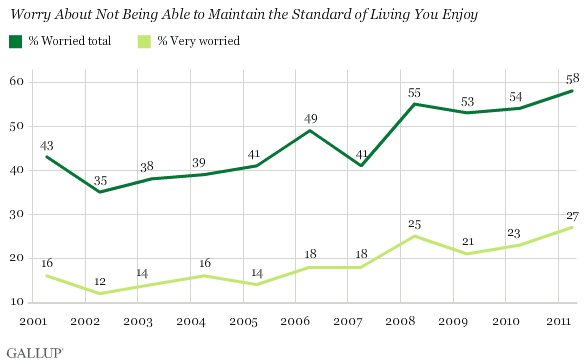
Concern About Money for Monthly Bills, Serious Illness/Accident Crept up Amid Recession
Americans' worries about not being able to pay medical costs for a serious illness or accident and not having enough money to pay their normal monthly bills increased in 2008 as the recession set in and have remained elevated since.
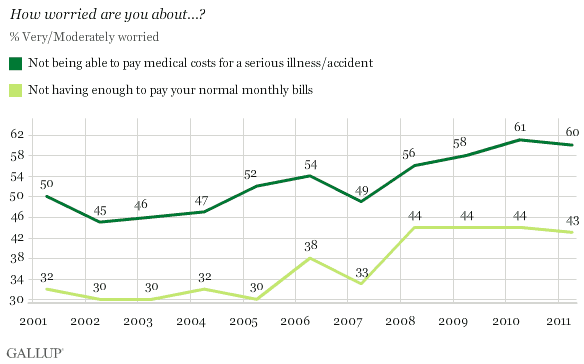
More Americans Very Worried About Retirement Funding vs. Early 2000s
While retirement has led Americans' financial worry list each year, the percentage who are very worried about this is significantly higher since 2008 compared with the early 2000s. The two-thirds of Americans who are now worried about funding their retirement ties the all-time high Gallup recorded last year.
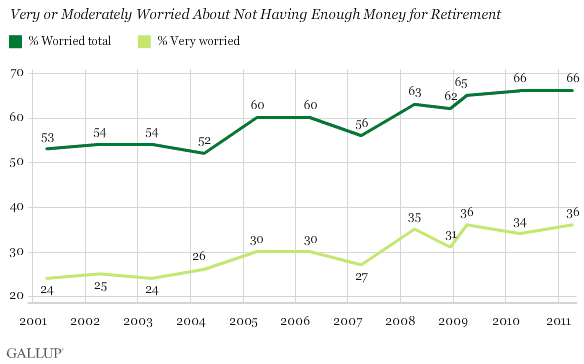
Retirement Issue Most Worrisome for 30- to 49-Year-Olds
Seventy-seven percent of Americans between the ages of 30 and 49 are very or somewhat worried about not having enough money for retirement. Seven in 10 50- to 64-year olds are also worried. Seniors -- who are the most likely to already be retired -- are much less worried, at 45%.
Retirement worries, however, are similar across income groups. Roughly two in three Americans in all income groups say they are worried about not being able to fund their retirement.
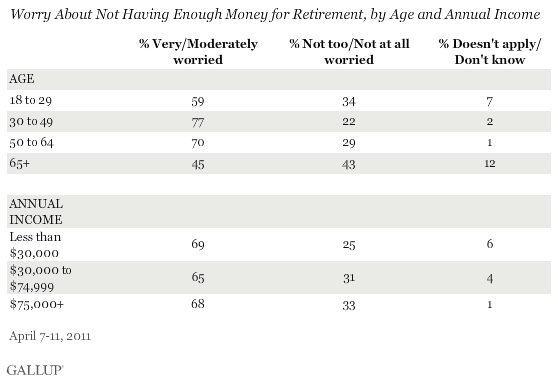
Bottom Line
In general, the recession had a significant effect on Americans' personal financial worries. More Americans are worried now about each of the eight items Gallup tracks than were so in the early 2000s. While Americans' concerns about being able to maintain their standard of living reached a new high this year, their predominant financial worry continues to be about being able to fund their retirement.
The state of retirement in America may be going through a transition period. Social Security and Medicare face insolvency, and government and union-funded pensions programs took a major hit during the 2008 economic crisis. Many Americans' personal retirement investment portfolios also suffered significantly amid the recession. Layer on high unemployment, and all of this adds up to a lot of worry about retirement.
Americans aged 30 to 49 -- who are the most worried about funding their retirement -- are also the most likely to say Social Security and Medicare are in a crisis. Additionally, Gallup has found non-retirees increasingly likely to believe they will have to fund their own retirement, relying more on 401(k)s and other self-directed retirement plans and less on Social Security and pensions than today's retirees. Thus, it is not surprising non-retirees' future financial security is a significant worry for them.
Lawmakers' ability to address Medicare and Social Security issues and the stock market's further recovery will likely have an effect on non-retirees' current and future financial well-being -- convincing them that they will be able to not only meet their basic needs in their retirement, but also have the financial security to spend these years doing the things they enjoy.
About the Gallup-Healthways Well-Being Index
The Gallup-Healthways Well-Being Index tracks U.S. and U.K. well-being and provides best-in-class solutions for a healthier world. To learn more, please visit well-beingindex.com.
Survey Methods
Results for this Gallup poll are based on telephone interviews conducted April 7-11, 2011, with a random sample of 1,077 adults, aged 18 and older, living in all 50 U.S. states and the District of Columbia, selected using random-digit-dial sampling.
For results based on the total sample of national adults, one can say with 95% confidence that the maximum margin of sampling error is ±4 percentage points.
Interviews are conducted with respondents on landline telephones and cellular phones, with interviews conducted in Spanish for respondents who are primarily Spanish-speaking. Each sample includes a minimum quota of 400 cell phone respondents and 600 landline respondents per 1,000 national adults, with additional minimum quotas among landline respondents for gender within region. Landline telephone numbers are chosen at random among listed telephone numbers. Cell phone numbers are selected using random-digit-dial methods. Landline respondents are chosen at random within each household on the basis of which member had the most recent birthday.
Samples are weighted by gender, age, race, Hispanic ethnicity, education, region, adults in the household, and phone status (cell phone only/landline only/both, cell phone mostly, and having an unlisted landline number). Demographic weighting targets are based on the March 2010 Current Population Survey figures for the aged 18 and older non-institutionalized population living in U.S. telephone households. All reported margins of sampling error include the computed design effects for weighting and sample design.
In addition to sampling error, question wording and practical difficulties in conducting surveys can introduce error or bias into the findings of public opinion polls.
For more details on Gallup's polling methodology, visit www.gallup.com.
